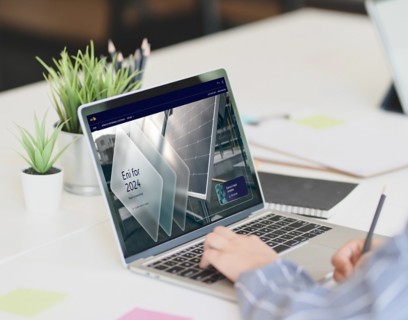Useful advice on the recruitment process
Our recruitment process includes an assessment of the applicant's CV and interviews to evaluate psychological and aptitude aspects as well as technical and professional skills.
Junior or expert profile?
The recruitment process changes depending on the applicant’s experience and on the requirements for the vacancy.
We assess the CVs of candidates who have applied for a vacancy or sent an unsolicited application through our online recruitment system. Based on the profile requirements, we assess:
- educational qualifications and grades obtained (for recent graduates with a Master's degree, a minimum grade of 100/110 is considered an advantage).
- language skills
- specialisations
- work experience
- willingness to relocate nationally and internationally
If your application is deemed suitable, we will contact you to further explore the information provided in your CV and assess its relevance to the vacancy.
In the technical-professional assessment you will take part in a technical interview focusing on your specialised skills, which will be conducted in collaboration with the managers of the professional department related to your potential role. This interview will focus on your educational background and your ability to apply your acquired knowledge in a business context.
The psycho-aptitude assessment looks at your soft skills, using Human Focus as a foundation. You will be evaluated in an assessment centre to identify your personal characteristics through situational exercises, group and individual interviews and questionnaires. These exercises are conducted in the presence of several evaluators and do not require specialist knowledge as they focus on assessing transversal skills. In some specific cases, the assessment centre may be replaced by an individual interview.
Applicants who successfully complete all of these stages may be contacted by the Human Resources team for further assessment.
At Eni, you are considered an Expert profile if you have at least three years of work experience. As an Expert profile, following your online application through our recruitment system, you will be assessed on the basis of the following requirements:
- work experience
- language skills
- willingness to relocate nationally and internationally
- educational qualifications and any specialisations.
If your application is deemed suitable, we will contact you to further explore the information provided in your CV and assess its relevance to the vacancy.
In the technical-professional assessment, you will attend a technical interview focusing on your specialist skills with the managers of the professional area in which you would potentially work. The interview will focus on your previous roles, the results you have achieved, your technical abilities, key skills and career expectations. The number of technical interviews may vary depending on the complexity of the role.
The psycho-aptitude assessment looks at your soft skills based on our model of excellence. You will be invited to participate in an individual interview where we will assess whether you have the professional characteristics required for the position. We will look at your expectations, motivations, professional background and the personal skills you have developed through your academic and professional experience.
Applicants who successfully complete all of these stages may be contacted by the Human Resources team for further assessment.
An inclusive recruitment process
One of the key goals of Eni's recruitment process is to ensure equal opportunities and promote diversity. We conduct the various stages of the process with a strong focus on inclusion, in line with Eni's mission, which values diversity as a core principle. We pay special attention to the unique features of each applicant, as we firmly believe that individual uniqueness is a source of strength.
Do you want to join our team?
Our tips on how to tackle the recruitment process successfully
4 useful tips for a successful recruitment process
When you are about to start a recruitment process, it is essential that you have good knowledge of the company and especially of the position you are applying for.
A good way to do this is using the company's website. Learn about the company’s main activities, in which countries it operates and in which professional areas the position you have chosen might fit.
It is crucial to have a clear understanding of why you have chosen one company over another. Your motivation shows that you have thought about your decision and have an idea of the type of company you would like to work for. At the same time, by clearly articulating your motivations, you make it clear to the recruiter what you can bring to the company and what your career aspirations are.
In addition to the knowledge, you have acquired through your university studies or previous work experience, you have also cultivated personal qualities that set you apart from others - your soft skills. In the workplace, soft skills are just as important as technical skills, which is why we evaluate them during the recruitment process. At Eni, this evaluation is based on Human Focus – the tool that allows us to read and identify behaviours and skills on the basis of a common language and to link each to its own role. Is there a universal set of soft skills? The answer is no. The importance of a particular soft skill depends on the type of position and role you are applying for.
Prepare a concise but concrete narrative that highlights the experiences you believe are most relevant to the position you are applying for. Explain these experiences by describing situations and telling anecdotes that highlight your soft skills, such as teamwork or how you managed to solve a problem.
4 tips for writing an impactful CV
When writing your CV, think about the information that makes you stand out and that could be essential for a particular job. Keep your CV to a maximum of two pages! During the initial screening process, recruiters focus on basic requirements, and these should be readily apparent. Is there an ideal format? The answer is no. Any format can be chosen as long as the CV is clear and concise. This does not mean that you cannot be creative: bear in mind that for roles that require it, creativity is considered a plus.
One of the first pieces of information recruiters need is the candidate's contact details, especially your phone number and e-mail address, in order to involve you in the subsequent stages of the recruitment process. These details should be highly visible, so put them at the top of your CV. If you want, you can also include a photograph of yourself. It is not compulsory, but if you choose to include one, make sure it is a professional image.
Your educational and work experience is essential to give recruiters an insight into your career path. To provide information that is both immediate and well-organised, always list them in chronological order, starting with your most recent experience. If you're a recent graduate, be sure to include your grade for educational experiences that involve a degree or diploma. Don't worry if you're a recent graduate with no work experience. Include experience outside your field of study, such as part-time jobs you had to support yourself financially while at university.
In an increasingly global and digital world, these skills are a must-have. At Eni, a minimum level of B1 in English is required, so it's important to clearly state your English language skills in your CV. If you speak other languages, list them along with your level of proficiency; they will certainly be regarded as a plus! Computer skills are also important and it's essential to include them in your CV, especially if you know how to use specific programmes or tools.
How to handle your first contact with a recruiter in 3 tips
During the call or online interview, the recruiter will spend time going through the key points in your CV. So be prepared to discuss it, but don't rush it! Talk about your experiences, focusing on each one and trying to identify activities and situations that are representative of them. It's also crucial to articulate your reasons for applying, but always keep them in the context of the company and the position you're applying for.
Showing genuine enthusiasm and interest in the position is the most effective way to make a lasting impression. However, to express your interest authentically, avoid preparing questions beforehand, but rather formulate them based on the information you have been given, always keeping the company's context in mind. Remember that active listening also helps to show your interest!
Clearly outlining your goals to the recruiter is crucial at this stage, as it will enable both you and the recruiter to determine whether the position really matches your profile. Don't hesitate to ask for additional details about the role and to seek clarification on the content of the advert. If you find that certain aspects of the role don't match your goals, such as relocation requirements or tasks that don't match your preferences, don't hesitate to raise these concerns with the recruiter. Remember, it's not just the company that chooses you; you have the prerogative to choose a role that matches your passions and aspirations!
3 useful tips for a video interview
Before starting a video interview, find a quiet place where you can talk without being disturbed. Check your internet connection and use headphones to improve audio quality. Make sure you have a suitable background, preferably neutral, and position your webcam so that it focuses on you - check for possible glare from lights. If connecting from a mobile device, keep it in a horizontal position for better visibility. Having trouble connecting? No worries! Keep a spare device close by.
Try to speak in a clear tone of voice and maintain direct eye contact with the recruiter by looking into the webcam now and then. Be aware of your posture, make sure the camera is capturing you from the mid-chest up and that your face is clearly visible.
If you're in a group video interview, pay attention to how the other applicants behave and interact with them. Listen to their points of view and don't hesitate to add your own. Be careful not to talk over them. Here's a helpful trick: remembering or writing down the names of the other candidates will make it easier for you to engage with them.
3 tips to stand out while dealing with the Assessment Center and/or the interview
The Assessment Center (AC) is a methodology designed to evaluate candidates' behaviour in simulated yet realistic situational exercises, both individually and in groups. It is essential to take an active part in the tasks set and to be open to evaluation. In a group exercise, for example, it's important to assert yourself by putting forward your ideas and demonstrating your interpersonal skills. But be careful: it is also important to be cautious and to assess the context before presenting your arguments.
The aptitude interview with the recruiter is the ideal moment to go into more detail about your educational and professional background. Before you start the interview, take a few minutes to reflect on your career path and the situations you think are worth discussing to give the recruiter an idea of how you made certain decisions (e.g. your choice of one university faculty over another, or the reasons why you chose a particular job, etc.).
During the AC, you may have found it difficult to manage certain aspects, for example, you may not have fully achieved the goal of the group exercise. Don't worry, there is no such thing as a perfect performance! Be open to reflecting not only on your successes, but also on the aspects that didn't go exactly as planned, to show the recruiter that you have thought about the issue.
Do you want to join our team?
Our tips on how to tackle the recruitment process successfully
How to make a difference
4 useful tips for a successful recruitment process
When you are about to start a recruitment process, it is essential that you have good knowledge of the company and especially of the position you are applying for.
A good way to do this is using the company's website. Learn about the company’s main activities, in which countries it operates and in which professional areas the position you have chosen might fit.
It is crucial to have a clear understanding of why you have chosen one company over another. Your motivation shows that you have thought about your decision and have an idea of the type of company you would like to work for. At the same time, by clearly articulating your motivations, you make it clear to the recruiter what you can bring to the company and what your career aspirations are.
In addition to the knowledge, you have acquired through your university studies or previous work experience, you have also cultivated personal qualities that set you apart from others - your soft skills. In the workplace, soft skills are just as important as technical skills, which is why we evaluate them during the recruitment process. At Eni, this evaluation is based on Human Focus – the tool that allows us to read and identify behaviours and skills on the basis of a common language and to link each to its own role. Is there a universal set of soft skills? The answer is no. The importance of a particular soft skill depends on the type of position and role you are applying for.
Prepare a concise but concrete narrative that highlights the experiences you believe are most relevant to the position you are applying for. Explain these experiences by describing situations and telling anecdotes that highlight your soft skills, such as teamwork or how you managed to solve a problem.
Do you want your profile to stand out? Start with your CV!
4 tips for writing an impactful CV
When writing your CV, think about the information that makes you stand out and that could be essential for a particular job. Keep your CV to a maximum of two pages! During the initial screening process, recruiters focus on basic requirements, and these should be readily apparent. Is there an ideal format? The answer is no. Any format can be chosen as long as the CV is clear and concise. This does not mean that you cannot be creative: bear in mind that for roles that require it, creativity is considered a plus.
One of the first pieces of information recruiters need is the candidate's contact details, especially your phone number and e-mail address, in order to involve you in the subsequent stages of the recruitment process. These details should be highly visible, so put them at the top of your CV. If you want, you can also include a photograph of yourself. It is not compulsory, but if you choose to include one, make sure it is a professional image.
Your educational and work experience is essential to give recruiters an insight into your career path. To provide information that is both immediate and well-organised, always list them in chronological order, starting with your most recent experience. If you're a recent graduate, be sure to include your grade for educational experiences that involve a degree or diploma. Don't worry if you're a recent graduate with no work experience. Include experience outside your field of study, such as part-time jobs you had to support yourself financially while at university.
In an increasingly global and digital world, these skills are a must-have. At Eni, a minimum level of B1 in English is required, so it's important to clearly state your English language skills in your CV. If you speak other languages, list them along with your level of proficiency; they will certainly be regarded as a plus! Computer skills are also important and it's essential to include them in your CV, especially if you know how to use specific programmes or tools.
Get ready for your call or online job interview
How to handle your first contact with a recruiter in 3 tips
During the call or online interview, the recruiter will spend time going through the key points in your CV. So be prepared to discuss it, but don't rush it! Talk about your experiences, focusing on each one and trying to identify activities and situations that are representative of them. It's also crucial to articulate your reasons for applying, but always keep them in the context of the company and the position you're applying for.
Showing genuine enthusiasm and interest in the position is the most effective way to make a lasting impression. However, to express your interest authentically, avoid preparing questions beforehand, but rather formulate them based on the information you have been given, always keeping the company's context in mind. Remember that active listening also helps to show your interest!
Clearly outlining your goals to the recruiter is crucial at this stage, as it will enable both you and the recruiter to determine whether the position really matches your profile. Don't hesitate to ask for additional details about the role and to seek clarification on the content of the advert. If you find that certain aspects of the role don't match your goals, such as relocation requirements or tasks that don't match your preferences, don't hesitate to raise these concerns with the recruiter. Remember, it's not just the company that chooses you; you have the prerogative to choose a role that matches your passions and aspirations!
How to best prepare for a video interview
3 useful tips for a video interview
Before starting a video interview, find a quiet place where you can talk without being disturbed. Check your internet connection and use headphones to improve audio quality. Make sure you have a suitable background, preferably neutral, and position your webcam so that it focuses on you - check for possible glare from lights. If connecting from a mobile device, keep it in a horizontal position for better visibility. Having trouble connecting? No worries! Keep a spare device close by.
Try to speak in a clear tone of voice and maintain direct eye contact with the recruiter by looking into the webcam now and then. Be aware of your posture, make sure the camera is capturing you from the mid-chest up and that your face is clearly visible.
If you're in a group video interview, pay attention to how the other applicants behave and interact with them. Listen to their points of view and don't hesitate to add your own. Be careful not to talk over them. Here's a helpful trick: remembering or writing down the names of the other candidates will make it easier for you to engage with them.
How to best deal with the Assessment Center and/or the interview
3 tips to stand out while dealing with the Assessment Center and/or the interview
The Assessment Center (AC) is a methodology designed to evaluate candidates' behaviour in simulated yet realistic situational exercises, both individually and in groups. It is essential to take an active part in the tasks set and to be open to evaluation. In a group exercise, for example, it's important to assert yourself by putting forward your ideas and demonstrating your interpersonal skills. But be careful: it is also important to be cautious and to assess the context before presenting your arguments.
The aptitude interview with the recruiter is the ideal moment to go into more detail about your educational and professional background. Before you start the interview, take a few minutes to reflect on your career path and the situations you think are worth discussing to give the recruiter an idea of how you made certain decisions (e.g. your choice of one university faculty over another, or the reasons why you chose a particular job, etc.).
During the AC, you may have found it difficult to manage certain aspects, for example, you may not have fully achieved the goal of the group exercise. Don't worry, there is no such thing as a perfect performance! Be open to reflecting not only on your successes, but also on the aspects that didn't go exactly as planned, to show the recruiter that you have thought about the issue.
Job opportunities
All available jobsSpeculative application
Haven't you found job opportunities in line with your characteristics? Fill in the form to send us your CV. At the end of the spontaneous application, choose if you want to receive e-mail alerts of new job vacancies.
Don't miss a single update
Sign up to our newsletter and activate your e-mail alert to discover the insights from the world of Eni
Useful information
Our recruitment and selection process is based on clarity and transparency. Below is some useful information.



















